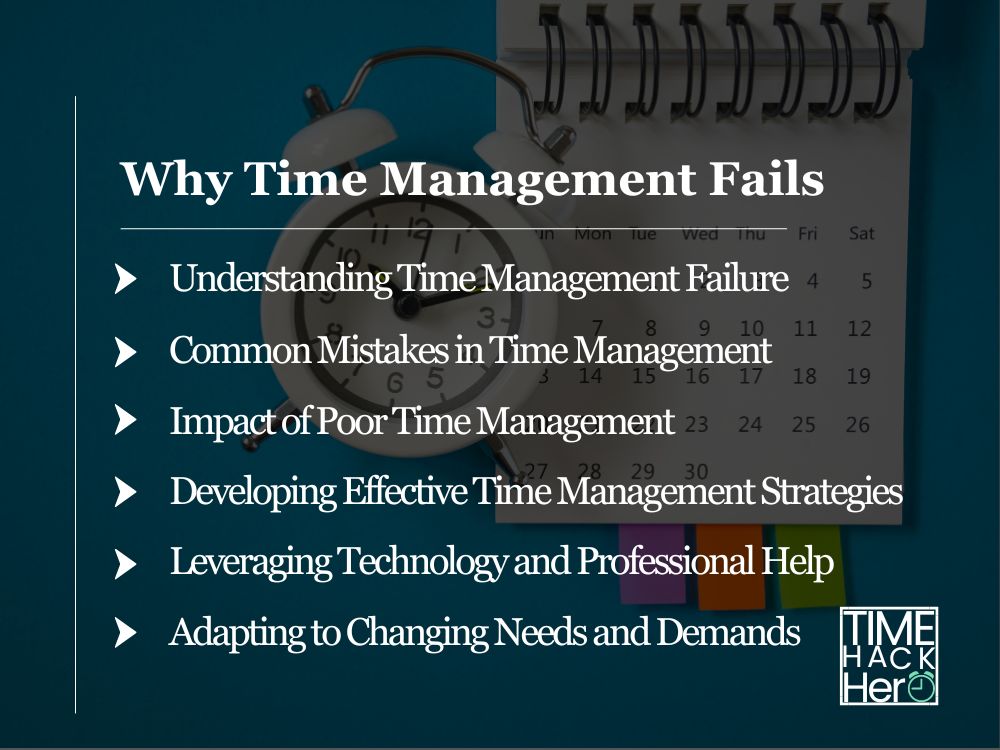In today’s fast-paced world, effective time management is often considered the key to success and productivity. With numerous strategies, techniques, and tools available, individuals and organizations alike have aimed to manage their time efficiently, hoping to gain control over their lives and reduce stress. However, it appears that conventional time management methods may not always be the ultimate solution to today’s challenges.
Indeed, time management has been touted as the remedy for the consistent feelings of overload and inadequacy that many people experience. Despite the adoption of various tactics, many still find themselves struggling to balance work, personal life, and mental well-being. This raises the question, why does time management so often fail? The answer may lie in the inherent and evolving complexities of modern life as well as the limitations of time management approaches themselves.
In this article, we will explore the key reasons behind the failure of time management methods and discuss how adapting our perspectives and expectations can pave the way for a more realistic understanding of productivity and life fulfillment. By delving into the potential pitfalls of conventional time management, we will uncover alternative ways to navigate the modern world’s demands without sacrificing our overall well-being.
Table of Contents
Understanding Time Management Failure
Misaligned Goals
Misaligned goals often contribute to the failure of time management efforts. When goals are not aligned with personal values or long-term objectives, it can be almost impossible to maintain the required focus and commitment. To avoid this problem, it is crucial to establish goals that are in line with one’s overall life vision and ensure that time management efforts are directed toward achieving them.
The Planning Fallacy
The planning fallacy is a cognitive bias that leads individuals to underestimate the time it takes to complete tasks. This miscalculation causes people to overcommit and set unrealistic deadlines, eventually leading to failure in managing their time effectively. To counter the planning fallacy, it is helpful to practice making more accurate estimations of how long tasks will take, considering possible obstacles and frequently reassessing progress.
Poor Prioritization
Poor prioritization is another reason why time management efforts fail. Spending time on less important tasks can detract from the focus on more critical activities, resulting in decreased productivity. To effectively prioritize tasks, it is essential to:
- Clearly define goals and objectives
- Identify tasks based on importance and urgency
- Create a to-do list that supports the achievement of the goals
- Continuously reassess priorities as situations change
Procrastination
Procrastination is the practice of delaying or postponing tasks, often as a result of fear, anxiety, or the desire for perfection. This behavior can lead to a vicious cycle of time management failure as it results in last-minute rushes, unfinished work, and increased stress levels. To overcome procrastination, implement strategies such as breaking tasks into smaller steps, setting deadlines, and focusing on progress rather than perfection.
Distractions
Distractions can significantly hinder effective time management, particularly in today’s world, where digital interruptions are widespread. The constant barrage of emails, messages, and social media notifications can make it challenging to maintain focus and productivity. To minimize distractions, it is vital to:
- Establish specific times for checking emails and engaging in social media
- Create a workspace that promotes concentration and eliminates external distractions
- Use time management tools and techniques to stay on track, such as the Pomodoro technique or the Eisenhower matrix
Common Mistakes in Time Management
Multitasking
Multitasking often seems like a productivity booster, but in reality, it can hinder your time management. When we try to work on multiple tasks simultaneously, we divide our attention and end up taking longer to complete each task.
- Solution: Focus on one task at a time and set specific goals for each segment of your day. This structured approach will allow you to concentrate more effectively and complete tasks more efficiently.
Overcommitting to Tasks
Overcommitting to tasks is another common time management mistake. When we take on too many tasks or set unrealistic goals, it becomes challenging to manage our time effectively, leading to stress and decreased productivity.
- Solution: Prioritize tasks based on their importance and deadlines. Break them down into smaller, manageable tasks, and allocate sufficient time to each. Learn to say no to additional tasks when your plate is already full.
Using Ineffective Tools
Relying on ineffective tools or not using any tools at all can lead to disorganization and poor time management. Tools play a crucial role in helping you plan, schedule, and track your tasks, ensuring your time is utilized efficiently.
- Solution: Explore various tools and applications designed for time management, such as calendars, task management apps, and time tracking tools. Find the tools that fit your workflow, and use them to organize and prioritize tasks effectively.
Impact of Poor Time Management
Stress and Burnout
Poor time management can lead to increased stress levels as individuals struggle to balance multiple tasks and deadlines. This constant state of stress can result in long-term consequences, such as:
- Decreased energy levels
- Difficulty concentrating
- Burnout
Finding ways to manage time effectively is essential to reduce stress and maintain overall well-being.
Decreased Productivity
When time is not managed efficiently, productivity can be greatly affected. Common time management issues that lead to decreased productivity include:
- Procrastination
- Inability to prioritize tasks
- Poor estimation of time needed
Addressing these issues and implementing effective time management strategies can boost productivity and contribute to overall success.
Strained Relationships
Lack of effective time management can also strain personal and professional relationships. This may be due to:
- Missed deadlines
- Unfulfilled commitments
- Constant stress from unfinished tasks
Understanding the impact of poor time management on relationships is important for maintaining a healthy balance between work and personal life.
Developing Effective Time Management Strategies
Setting SMART Goals
Setting specific, measurable, achievable, relevant, and time-based (SMART) goals is the first step to managing your time effectively. With SMART goals, you create a clear direction and target for your tasks, which increases your chances of completing them on time. Consider the following recommendations:
- Be specific and clear with your goals
- Establish measurable outcomes
- Set attainable and realistic expectations
- Ensure your objectives align with your priorities
- Define a deadline to track progress and stay focused
Creating a Realistic Schedule
Designing a realistic schedule is crucial for efficient time management. It allows you to allocate time for essential tasks and helps you stay organized. Here are some tips for creating a productive schedule:
- Break down large tasks into smaller, manageable ones
- Assign a specific duration to each task
- Factor in buffer time for unexpected interruptions or distractions
- Reserve time for breaks and self-care
- Regularly review and adjust your schedule as needed
Principles of Prioritization
Prioritizing tasks effectively can significantly improve your time management skills. Following these prioritization principles will help you focus on crucial tasks, leading to better productivity and reduced stress:
- Categorize tasks into four quadrants based on urgency and importance, such as:
- Urgent and important
- Important but not urgent
- Urgent but not important
- Neither urgent nor important
- Allocate resources and time accordingly, focusing on tasks in the first quadrant
- Delegate or postpone tasks in the other quadrants as appropriate
- Create a to-do list based on this categorization to track your progress and maintain a structured approach to your tasks.
Leveraging Technology and Professional Help
Choosing Efficient Task Management Apps
There are numerous task management applications available to help you streamline your time-management process. These applications can assist you in prioritizing tasks, setting deadlines, and tracking progress. Some popular choices include:
- Trello: A visual project management tool that organizes tasks in a card and board system. It allows you to create customized boards, add checklists, and collaborate with team members.
- Todoist: A powerful to-do list and task management app known for its simplicity and ease of use. It allows you to categorize tasks, set due dates, and sync across devices.
- Wunderlist: A cloud-based app that enables you to create, share, and collaborate on lists. It facilitates organizing tasks in multiple categories, setting deadlines, and assigning tasks to others.
It is essential to explore different options and select an app that best suits your specific needs and preferences.
Working with a Time Management Coach
Sometimes, tools and technology may not be enough to address time-management challenges. In such cases, seeking professional help from a time-management coach can be beneficial. A coach will help you:
- Identify the root causes of your time management issues
- Develop personalized strategies for improvement
- Set realistic goals and create an action plan
- Review your progress, make adjustments, and provide accountability
Working with a coach, you can develop habits and routines that enable you to manage your time effectively. They can also provide insights on balancing priorities and making efficient use of technology.
Remember to do thorough research when selecting a time management coach. Ask for recommendations from friends, colleagues, or online reviews. Select a coach who has a proven track record and aligns with your goals and personality.
Adapting to Changing Needs and Demands
Developing Personal Awareness
Developing personal awareness is crucial in understanding why time management fails. It involves recognizing and evaluating how one’s actions, priorities, and habits affect both the time spent on tasks and overall productivity. By identifying areas for improvement and recognizing patterns, individuals can make informed decisions on how best to allocate their attention and time.
One common pitfall is allowing oneself to be constantly interrupted by emails, instant messages, and colleague requests. It’s critical to manage these distractions, which can include setting aside dedicated periods for responding to communication or turning off notifications during deep work sessions.
Balancing Work and Rest
Achieving a sustainable balance between work tasks and rest periods plays a major role in combating time management failure. Often, individuals attempt to push through hours of intense work without taking breaks, resulting in a decrease in overall productivity and effectiveness. Rest is important in maintaining focus and mental energy doing important tasks.
To balance work and rest, consider the following suggestions:
- Schedule regular breaks: Ensure that you have short breaks throughout the day to recharge and maintain focus.
- Prioritize downtime: Allocate time for activities outside of work, such as hobbies, socializing, and exercise, which can help maintain a healthy work-life balance.
- Practice mindfulness: Include meditation or simple mindfulness exercises in your daily routine to enhance focus and overall well-being.
In summary, adapting to changing needs and demands in time management requires developing personal awareness and balancing work and rest periods. By addressing these aspects, individuals can be better equipped to overcome the challenges associated with managing their time effectively.









